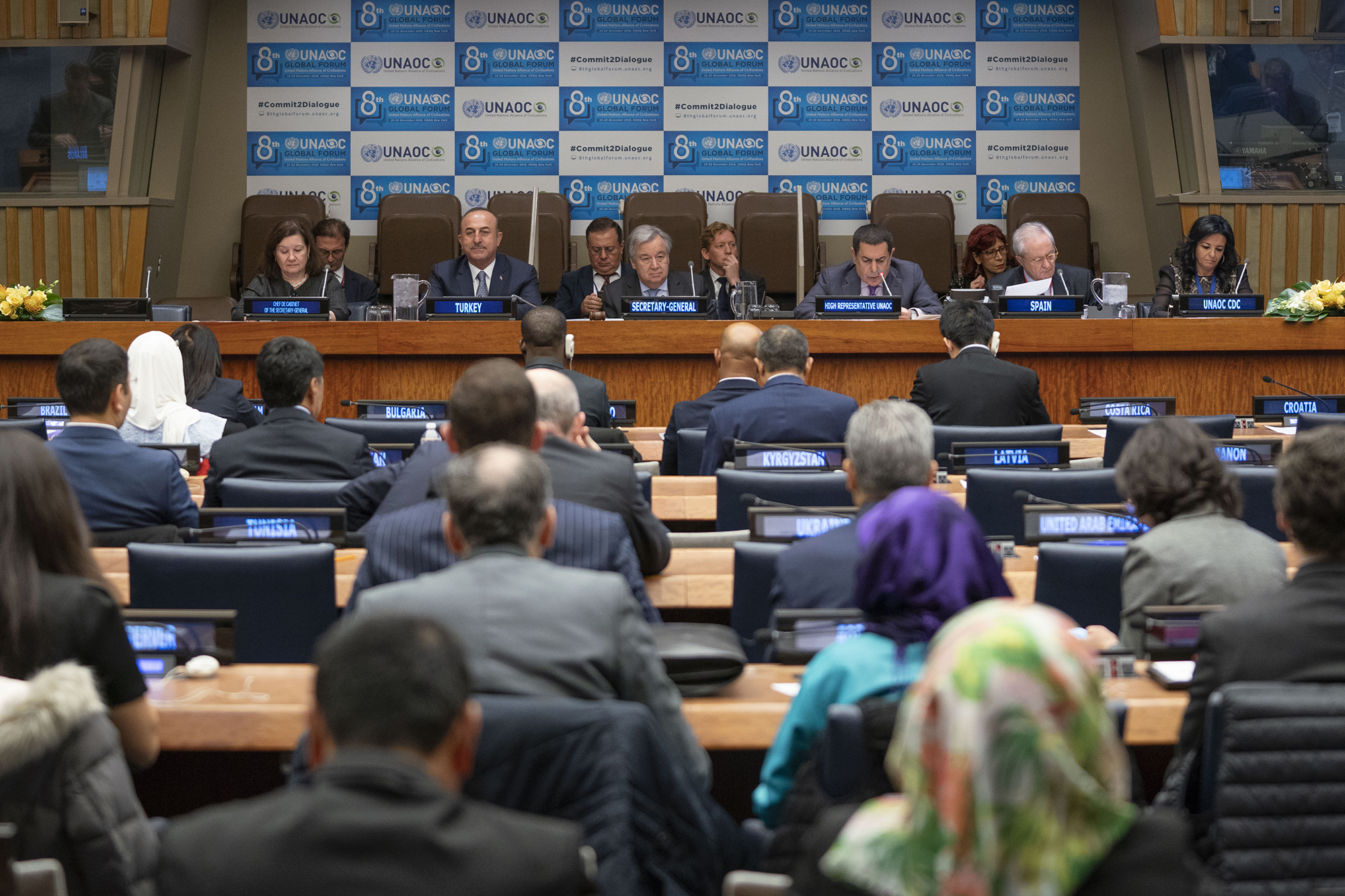Group of Friends Ministerial Meeting
Statement By The High Representative for the United Nations Alliance of Civilizations
His Excellency Mr. Nassir Abdulaziz Al-Nasser
PART 1
Excellencies,
Mr. Secretary-General,
Ladies and gentlemen,
It is my great pleasure to welcome you to the second Ministerial Meeting in 2018.
I wish to begin my remarks by thanking Secretary-General Antonio Guterres for his kind words about me in his remarks yesterday. I also thank him for his support for the Alliance since the beginning of his mandate.
At the outset, I wish to extend my gratitude for the long-standing financial support from my country, the State of Qatar, under the leadership of His Highness the Emir, Sheikh Tamim bin Hamad Al-Thani.
My special thanks go to Her Highness Sheikha Moza Bint Nasser, for her unwavering commitment and support since the UNAOC’s inception.
Once again, I express my deep appreciation to the co-sponsors of the United Nations Alliance of Civilizations – the Governments of Spain and Turkey – and all members of the Group of Friends, for your ongoing support, both political and financial. The work of UNAOC depends on it.
I also praise the stewardship of former Secretary-General Ban Ki-moon, who always had UNAOC in his heart and was always keen on actively participating in all our previous Global Forums. His vision and leadership laid the groundwork for a more peaceful, more socially inclusive world by building bridges of communication and understanding. I thank him for the trust he bestowed on me.
Distinguished Guests, Ladies and Gentlemen,
Every era experiences its unique set of challenges and tribulations.
Last week, we paused to mark the centenary of the end of the First World War. Nine million combatants and seven million civilians perished as a direct consequence of the war.
The “war to end all wars,” as coined by President Woodrow Wilson, was quickly overshadowed by a deadly wave of nationalism and racism during the interwar period.
Tragically, the world found itself at war again. Yet, from its ashes, the United Nations arose dedicated to promoting the best of humankind, propelled by collective action and common purpose.
It is an unfortunate fact, however, that many of the challenges we face today are not so different from those faced by our founders.
Seven decades after the entry into force of the United Nations Charter, millions have been killed and displaced as a result of war and conflict.
Racism and xenophobia are on the march. We are witnessing a resurgence of hate and intolerance, in which migrants and refugees face the brunt of discriminatory and exclusionary policies.
Terrorist organizations and violent extremists have exploited these tensions, unleashing a barbarism that will forever mark the first two decades of the twenty-first century.
In too many corners of the world, human rights are in jeopardy. And the space for civil society has been shrinking in exactly the places that need it the most.
In this current context, we need to face identity-based tensions squarely and honestly.
This constitutes the UNAOC’s core mission. The pioneers of the Alliance were as determined as the United Nations founders in re-imagining a world, where nations would cooperate rather than clash; where mutual respect and understanding would replace fear and suspicion.
I urge all Members of the Alliance to remain steadfast in pursuit of this commitment.
I thank you.
PART 2
Excellencies,
Ladies and gentlemen,
I would like to welcome you again to the last Group of Friends Meeting that I will chair. I would also like to congratulate my friend Mr. Miguel Moratinos as my successor and wish him a successful tenure.
Before we begin the next segment of our meeting, please allow me to reflect on the summary report of UNAOC Achievements 2013-2018 that was sent to all members of the UNAOC Group of Friends.
When I assumed my mandate at UNAOC as High Representative in 2013, I was heartened by the achievements made by my predecessor, His Excellency President Jorge Sampaio, and mindful of both the challenges and opportunities confronting my Office.
Moving operations to New York helped in mainstreaming UNAOC activities into the United Nations Secretariat and other United Nations entities. This action strengthened the visibility of UNAOC within the United Nations system and beyond. Today, our young organization is an active member of several inter-agency working groups.
During the course of 6 years, I witnessed first-hand how UNAOC projects helped bridge the widening rift between civilizations, having a positive impact on the lives of thousands of people, particularly young people. Allow me to take a moment to illustrate our achievements with a few examples.
In order to have meaningful impact, we anchored our project activities in four areas: youth, education, media and migration.
First, I made it one of my main priorities to create an enabling environment for young peace-builders. The focus has always been on achieving impact.
Since 2005, UNAOC identified, developed and showcased the contributions of thousands of young people. From Dakar to Amman, Colombo to Uganda, we partnered with thousands of young peacebuilders to prevent crises and advance peace.
Since 2008, the Youth Solidarity Fund has provided seed funding to 57 youth-led organizations to implement projects promoting intercultural and interfaith dialogue. These projects were completed in 34 countries and directly impacted more than 90,000 individuals. A further 1.3 million indirect beneficiaries were reached through project activities.
Between 2016 and 2018, 40 regional youth leaders, aged 18 to 25, from 23 different countries, were trained in intercultural understanding, and conflict analysis during the first and second edition of the Young Peacebuilders programme. These participants reached over 1,000 individuals by organizing step-down peace activities in their own organizations and communities.
I am pleased to note that the Secretary-General’s Youth Strategy, and Security Council resolutions 2250 and 2419 provide further impetus to expand our youth programming.
Several of our flagship initiatives were also scaled and reinforced as they celebrated their third or fourth editions – this was the case of the Fellowship Programme and the #spreadnohate campaign for preventing hate speech against migrants and refugees in new and traditional media.
Second, we recognized the importance of harnessing the creativity and innovation of the private sector.
Since 2011, the Intercultural Innovation Award, a partnership between UNAOC and BMW Group, has supported more than 40 organizations in 31 countries to expand and scale their innovative projects encouraging intercultural dialogue. The selected organizations expanded their operations to over 100 countries, impacting around 2 million beneficiaries. This could not have been made possible without the leadership and generous financial contributions from BMW Group.
Third, we strengthened and deepened our relationship with civil society organizations, particularly religious leaders and faith-based organizations in three key areas: advocacy, capacity building and knowledge management. I encourage my successor, and indeed, the United Nations as a whole, to continue to strengthen dialogue among religious leaders and broaden their contribution in peace-building efforts. I look forward to learning more about their specific contributions in conflict prevention, mediation, and reconciliation during the breakout session starting soon.
Fourth, we expanded our Alliance to include new actors.
Today, 120 countries and 26 international organizations are members of the UNAOC’s Group of Friends, which also acts in partnership with hundreds of civil society actors.
63 Memorandum of Understanding were signed with academic institutions, think tanks, foundations and international organizations to amplify the impact of UNAOC’s work.
Fifth, partnerships and activities were streamlined within the United Nations system. One of my priorities when I assumed the post was to explore the possibilities to develop joint or mutually reinforcing capacity-building initiatives with other United Nations entities. I am convinced that this “whole-of-UN” approach yielded positive results during the past few years.
Last but not least, I have highlighted in the report the financial and structural challenges facing UNAOC. Given the evolving nature of the scope and scale of work of UNAOC over the course of years, there is a critical need to re-configure the structure of UNAOC staffing. I highly recommend that such action would take place as soon as possible for better coordination and planning across the 4 pillars.
Excellencies, ladies and gentlemen,
As I conclude, let us remember that no single country or organization can address today’s challenges alone.
I take this opportunity to thank the hosts of previous Global Forums, namely the Governments of Spain, Turkey, Brazil, Qatar, Austria, Indonesia and Azerbaijan. Our Forums are not simply about dialogue. They have provided a unique platform to mobilize the energy and creativity of a range of partners. Partners that are committed to delivering concrete projects that make a real difference in local communities.
Today, more than ever, our dedication to the Alliance’s goals must remain principled and strong.
I leave you with these parting words: we can either choose to perpetuate an artificial image of the world comprised of exclusive cultures, religions, or civilizations, historically distinct and destined for confrontation. Or, we recommit to a concerted effort – a sustained effort – to promote our shared humanity and interdependence in our quest for stability, prosperity and peaceful coexistence.
I am betting on our collective capacity to offer new imagination and determination for achieving our shared goal: a more harmonious society founded on a culture of peace, respect for human rights and improved development for all.
I cannot conclude without commending the UNAOC staff and especially my cabinet for their dedication, diligence and hard work without which my mission would not have been successful. I truly thank you.
Thank you.

